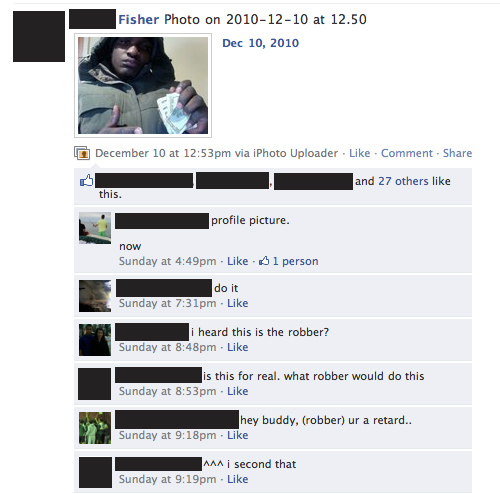
Ok….this has to be the absolute dumbest guy alive!
A robber steals a laptop and more items from a home. He then takes a picture of himself and posts it on the owner’s son’s Facebook account. (Real smart, buddy!!) Come to find out the owner of the house just so happens to be a writer for the Washington Post. Read the full story below…
The e-mail from my son was urgent; the subject line read simply “help.” My wife and I ran to the car, dialed 911 and headed home, where D.C. police officers were just arriving as we pulled in. Sometime between 10 a.m. and 12:45 p.m. Friday, a burglar busted through our basement door — simply kicked through the 80-year-old wood panels — and took a bunch of stuff. My son, 15, got hit hardest; his laptop, iPod, savings bonds and cash were gone. Just one more example of life in the big city. Except that the apparent thief didn’t stop with taking our belongings.
He felt compelled to showboat about his big achievement: He opened my son’s computer, took a photo of himself sneering as he pointed to the cash lifted from my son’s desk, and then went on my son’s Facebook account and posted the picture for 400 teenagers to see. In the picture, the man is wearing my new winter coat, the one that was stolen right out of the Macy’s box it had just arrived in.
“I’ve seen a lot, but this is the most stupid criminal I’ve ever seen,” marveled D.C. police Officer Kyle Roe, who stayed with us for hours as we waited for the crime scene technician, who painstakingly lifted dozens of fingerprints from nearly every room in the house.
My son was coping brilliantly with the trauma of losing his belongings — until he saw the invasion of his Facebook page. That’s when the pathetic indignity of the burglary hit. Here was a space that my son had carefully walled off from public view, limiting access to his page to his friends and schoolmates. And now a lowlife stranger was taunting him in that presumably private zone.
Facebook has become an irresistible platform for a certain kind of bad guy to flaunt his misdeeds to police and victims. And savvy prosecutors have figured out that a thorough search of social media can sometimes produce evidence that undercuts a defendant’s fanciful version of his own innocence.
Tuesday, the FBI arrested an Arlington man who had posted on Facebook that he could put pipe bombs on Metro cars or in Georgetown at rush hour. In a California case, a prosecutor was about to recommend probation for a drunk driver who caused a crash that killed her passenger, but then the prosecutor happened to check the driver’s MySpace page. Bingo: photos and comments showing the defendant joking about drinking. The photos, demonstrating how lightly the driver took the issue, helped win a two-year prison sentence.
In Ottawa this fall, the staff at a sporting goods store took just 15 minutes to identify a shoplifter by matching an image on their security video with one of the 324 people who had clicked “Like” on the store’s Facebook page. Police found the culprit and got the stolen merchandise back in less than 48 hours. And in New York last month, a thief was sentenced to five years in prison after he posted on his own MySpace page a photo of himself with his victim’s watch and ring, just a day after he mugged a man at a Manhattan bus stop.
New York City police don’t wait for the crooks to come to them; they regularly scan Twitter for clues about bad guys, especially in gang investigations. The D.C. police seemed intrigued by the photo in our case, though they were a bit unclear about how to proceed. “Full frontal photo,” one officer said. “That’s pretty great.”
I thought this was as close to a slam-dunk case as there could ever be. I thought that by handing over the photo, I was delivering the police an instant arrest. I thought wrong. Two officers confided that they and their colleagues rarely press hard on burglary cases because the courts almost always let thieves go with nothing more than probation. Maybe that’s why four days after we handed over the photo, we were still waiting to hear from the detective assigned to the case.
Burglaries are up 11 percent citywide this year, to a total that will top 4,000 — most likely a reflection of continued hard times, especially since virtually every other category of crime is down. D.C. police made 30 burglary arrests in the last two weeks of November, up from six in the same weeks last year. Nationwide, police solved only 12 percent of burglaries last year, according to FBI data; in big cities such as Washington, the figure often is barely more than half that high. No wonder the guy in our photo wore such a confident smirk.
The special wrinkle to our case brought immediate attention from Facebook, whose executives and security investigators zipped into action, securing my son’s account, tracing the movements of the burglar and assuring that the criminal could no longer use the stolen computer to access my son’s data.
Facebook is now awaiting a subpoena from D.C. police, after which the company will hand over information about when and where the burglar used my son’s computer. “Facebook strives to respect the balance between law enforcement’s need for information to aid criminal investigations and the privacy rights of our users,” said Andrew Noyes, a spokesman for Facebook. “As a responsible company, we adhere to the letter and spirit of the law.”
The good news, of course, is that no one was hurt, and virtually everything the burglar took is replaceable. One exception: On my son’s computer, but never backed up, was one of the greatest documents ever, something he would have cherished all his life. He had meticulously kept a running list of every movie he had ever seen, hundreds and hundreds, with his comments on each. It’s gone — a reminder of the new reality that computers and Facebook have created, a world in which a document meant to last a lifetime can disappear in an instant, and a photograph meant as an impulsive gloat lives forever.

Wow! What a dumbass. It seems like criminals get dumber and dumber (and more dumber) EVERY …. SINGLE …. DAY!






